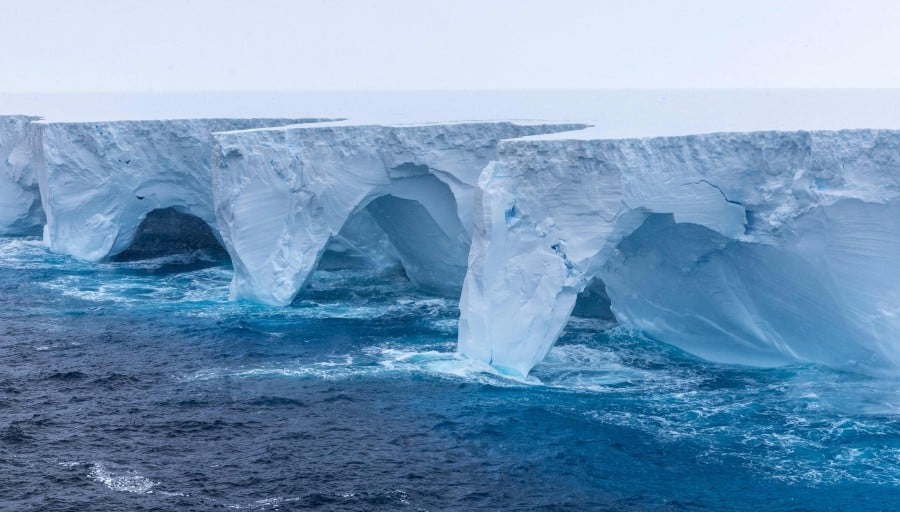MALAYSIA'S involvement in Antarctic research started in 1999, when Malaysian researchers under the auspices of the Malaysian Antarctic Research Programme (MARP), first joined a collaborative scientific expedition with New Zealand.
The increased number of researchers from various universities saw the establishment of the National Antarctic Research Centre (NARC) in 2002 as a research coordinator. Later, the inauguration of the Sultan Mizan Antarctica Research Foundation (YPASM) in July 2012, strengthened Malaysian research endeavours in the hostile environment of this important continent.
Antarctica holds vital clues to the intricate processes of our planet. Often described as a natural laboratory, it plays a central role in Earth's climate system. The Southern Ocean that circles Antarctica connects three major ocean basins and the circulation of it waters and temperature are strongly affected by the ice in Antarctica.
The Southern Ocean is the most powerful carbon sink and absorbs about 30 per cent of human-caused carbon dioxide output. The destruction of its ecosystem and biodiversity would reduce its ability to capture carbon, hence increasing the Earth's temperature.
It is also imperative to note that the Antarctic Ice Sheet is largest storage of fresh water on Earth — equivalent to almost 60m of sea level. One would be able to imagine the environmental catastrophy should this ice sheet collapse.
In simpler terms, what happens in Antarctica affects the whole planet and Malaysia would not be spared its effects.
Activities in Antarctica is regulated by the Antarctic Treaty, with 29 countries granted the consultative right by showing significant effort to preserve the Antarctic environment. This is demonstrated by their massive investment in establishing and maintaining research bases on the continent.
Most of these countries, including the United States, Russia, United Kingdom, Germany, China, India, Japan and South Korea, are geographically remote from Antarctica. In their permanent research bases, scientists and support staff spend almost one year (casually termed "overwinter"), facing not only scientific challenges but also psychological and physical strains.
Despite these challenges, they persist in their quest for knowledge, driven by the promise of groundbreaking discoveries on Antarctica's role in regulating our planet.
Being engaged with the Korea Polar Research Institute (KOPRI) since 2013 and having visited their King Sejong Station in the West Antarctic Peninsula three times, I understand and admire the sacrifices made by their overwinter members to uphold South Korea's agenda in Antarctic research.
South Korea started this permanent base at the end of 1988, the same year it hosted the Olympic Games in Seoul. This was when South Korea started to regain economic prosperity that was long impeded by the Korean War in 1950. Their struggles did not stop them from taking steps to the forefront of Antarctic research.
The establishment of YPASM (under the Natural Resources and Environmental Sustainability Ministry) showed that Malaysia was also determined to put substantial commitment in Antarctic and climate research. Since 2012, YPASM has provided more than RM8 million in research grants and fellowships.
Since Malaysia does not have one a research base in Antarctica, this financial support was mainly to help Malaysian researchers seek collaboration with couinterparts from countries that do.
As a non-consultative member of the Antarctic Treaty, Malaysia also holds a limited role in decision-making processes. The path forward involves aspiring towards consultative status, which first must be proved by showing sustained commitment to Antarctica mainly by having its own research base. This approach aligns with Malaysia's dedication in safeguarding the Earth from climate change.
Malaysia is among the 196 countries that signed the Paris Agreement that aims to keep the rise in mean global temperature to below 1.5°C above pre-industrial levels. While our ratification of the agreement and commitment to reduce carbon intensity are praiseworthy, monitoring the Antarctica's characteristics is equally important in tackling climate issues.
Moreover, among the targets of the Paris Agreement is to slow or stop Antarctic Ice Sheet loss and its effect in increasing sea levels.
Some might argue that we should focus on efforts within a regional scale without the need to commit to a more expensive endeavour in a continent remote from us. But, by recognising that we also contribute to the warming of the Earth, the responsibility to preserve Antarctica should therefore not be shunned.
Malaysia's vision to increase commitment in Antarctic research is now spearheaded by the YPASM and NARC.
Charting the way forward in this vision requires support from related ministries and other agencies so that we too, can be a leader in addressing climate change and not merely be at the receiving end of others' efforts to understand the issues.
The writer is deputy director of National Antarctic Research Centre. He was at King Sejong Station, West Antarctic Peninsula from Dec 15 to Jan 12 to study the impact of glacier melting on seabed ecosystems. The study was funded by YPASM and supported by the Korea Polar Research Institute. He can be reached at [email protected]





